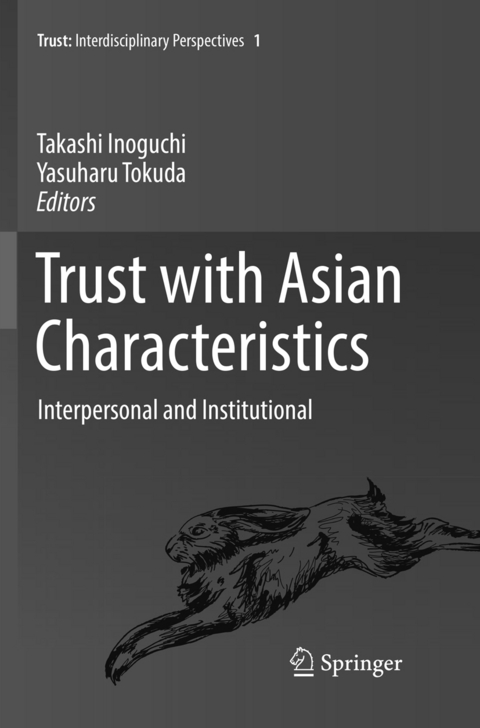
Trust with Asian Characteristics
Springer Verlag, Singapore
978-981-10-9588-7 (ISBN)
Trust is a key intermediate variable linking an individual and a broader society. Yet systematically and scientifically assembled data have tended to be narrowly focused on Western societies. In the 2000s non-Western data on the quality of life have steadily increased. The AsiaBarometer survey, however, is the instrument that best examines the quality of life in a large number of Asian societies with nationwide random sampling and face-to-faceinterviewing, with the number of samples ranging from 1,000 to 3,000.
In gauging interpersonal trust, the question, "Generally, do you think people can be trusted, or do you think that you can't be too careful in dealing with people (i.e., that it pays to be wary of people)?" is asked along with additional questions. In measuring institutional trust, the question is asked: "How much confidence do you place in the following institutions?" (Listed are the central government, the courts, the military, the police, political parties, the parliament, mass media, business companies, medical hospitals, and other institutions.) In examining interpersonal and institutional trust Asia-wide, special attention is paid to historical and geo-cultural backgrounds of the societies being surveyed. Examination of the link between trust of mass media and individual health and between trust in medical care and individual health focuses on Japan.Among the 12 chapters, 9 are reprints of journal articles published in the 2000s, and the introduction and 2 other chapters were written especially for this book to reflect the latest progress in the field. This work provides a rich source to be consulted by a wide range of readers interested in comparative politics, quality of life, and Asia in general.
1. Introduction.- 2.Interpersonal Trust.- 2.1. Social Capital in Ten Asian Societies.- 2.2. Social Capital in East Asia: Comparative Political Culture in Confucian Societies.- 2.3. Quantifying Social Capital in Central and South Asia: Are There Democratic, Developmental, and Regionalizing Potentials?.- 2.4. Psychometric Approach to Social Capital: Using AsiaBarometer Survey Data in 29 Asian Societies.- 2.5. Interpersonal Mistrust and Unhappiness among Japanese People.- 2.6 Interpersonal Trust and Quality of Life: A Cross-Sectional Study in Japan.- 2.7 Individual and Country-Level Effects of Social Trust on Happiness: The Asia Barometer Survey.- 3. Institutional Trust.- 3.1. Government Performance and Confidence in Political Institutions.- 3.2. Sociotropic and Pocketbook Politics in Japan.- 3.3. Influence of Income on Health Status and Healthcare Utilization in Working Adults: an Illustration of Health among the Working Poor in Japan.- 3.4 The relationship between trust in mass media and the healthcare system and individual health: evidence from the AsiaBarometer Survey.
| Erscheinungsdatum | 06.10.2018 |
|---|---|
| Reihe/Serie | Trust ; 1 |
| Zusatzinfo | 36 Illustrations, black and white; XII, 210 p. 36 illus. |
| Verlagsort | Singapore |
| Sprache | englisch |
| Maße | 155 x 235 mm |
| Themenwelt | Studium ► Querschnittsbereiche ► Prävention / Gesundheitsförderung |
| Sozialwissenschaften ► Politik / Verwaltung ► Vergleichende Politikwissenschaften | |
| Sozialwissenschaften ► Soziologie ► Empirische Sozialforschung | |
| ISBN-10 | 981-10-9588-4 / 9811095884 |
| ISBN-13 | 978-981-10-9588-7 / 9789811095887 |
| Zustand | Neuware |
| Informationen gemäß Produktsicherheitsverordnung (GPSR) | |
| Haben Sie eine Frage zum Produkt? |
aus dem Bereich


